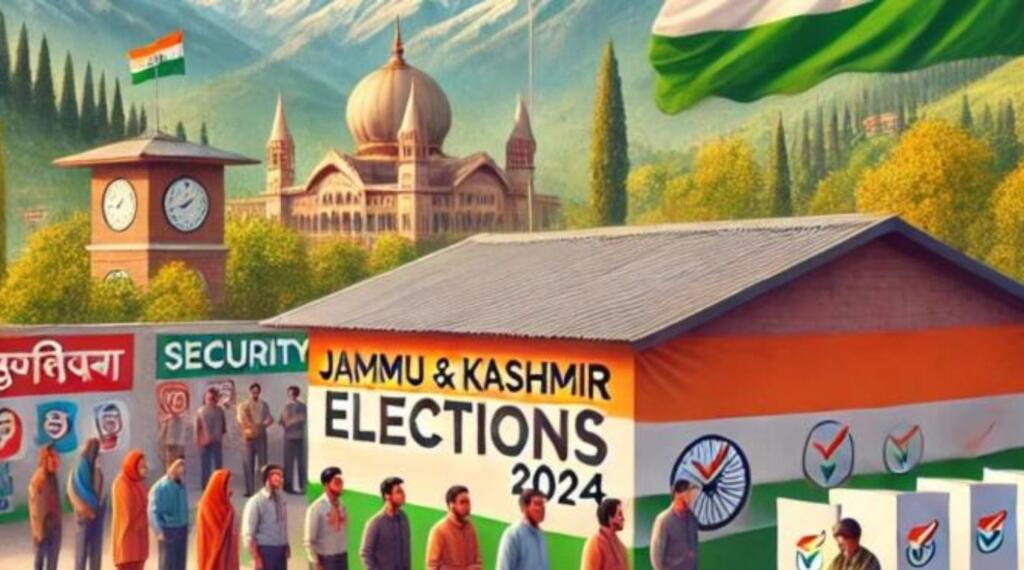In the ongoing Jammu and Kashmir assembly (J&K) elections, voters in large numbers have been exercising their franchise to elect ‘people’s representatives’. In a shining example of thriving democracy in the valley, the multi-corner contest has been witnessing high voter turnout crossing the 60% mark in the first two phases of polling. Mainly, the Congress-NC-led alliance, BJP, PDP, and out-on-bail UAPA accused Engineer Rashid-led outfits are vying for 90 seats in the Union territory of Jammu and Kashmir.
The valley, which once experienced dark clouds of terrorism and radicalism, has seen largely peaceful elections. After the abrogation of Article 370, the incidences of stone pelting have become a thing of the past and the stern counter-terror policy has shattered the morale of the Pak-sponsored separatist elements and terrorists in the valley to a large extent. After the abrogation, the roots of democracy and the Indian Constitution have deeply entrenched themselves in the valley in the true sense.
Amidst the glaring signs of thriving democracy, the usual suspects of the Islamist-leftist lobby have been falsely peddling a narrative that democracy “was” dead in Kashmir and that the ‘elections’ are being conducted after “10 years”. Additionally, they also have been trumpeting the bandwagon of ‘Aman ki Asha’ and peace talks with Pakistan, as according to them, this will be for the betterment of both countries, particularly for the welfare of Kashmiris.
However, contrary to the narrative, elections in J&K are being held after a gap of five years from their usual timeline in the wake of a lack of conducive security conditions. The lobby, which has been throwing the “elections being held after ten years” phrase at the drop of a hat, has conveniently pushed one of the darkest chapters of democracy under the rag. The so-called champions of democracy – Congress-National Conference and its supportive ecosystem – have hidden the fact that no ‘elections’ were held in the erstwhile state of Jammu and Kashmir till 1967. In another travesty with the Indian constitution and democracy, the MPs who ideally should had been ‘people’s representatives’ were ‘selected’ by Sheikh Abdullah.
Evidently, while the country saw Lok Sabha elections in 1952, 1957, and 1962, no such democratic exercise was undertaken for the 6 seats of Jammu and Kashmir.
On the contrary, these 6 members were nominated (selected) by Sheikh Abdullah’s ‘National Conference’ (earlier known as ‘Jammu and Kashmir Muslim Conference’). After getting ‘assent’ from NC, they were given the status of MPs in Delhi. Simply put, the people’s representatives were not elected by the voters but were selected as the candidates of Sheikh Abdullah.
What was the scenario before 1967? Congress-backed Sheikh Abdullah trampled democracy and pro-Indian sentiments in the valley
It is pertinent to note that the Lok Sabha elections were held for the first time in Jammu and Kashmir in 1967. While nominating 6 Lok Sabha and 4 Rajya Sabha MPs in 1952, Sheikh Mohammad Abdullah had said that under normal circumstances, elections would have been held in Jammu and Kashmir like the rest of the country, but since a part of the state is under enemy occupation and people are scattered between India and Pakistan, a different method has been adopted for elections here.
Ironically, the same process was repeated in 1952 and 1957. Because of this many hardliners who had an anti-India stance also reached the Parliament.
For example, take the case of Sheikh Mohammad Akbar who was made a member of parliament in 1957. He not only rejected the agreement made by Sheikh Abdullah with the Indian government but also led the separatists who wanted a referendum in Jammu and Kashmir. The separatist remember him as a “freedom fighter”.
Likewise, many other separatist leaders also reached the parliament. Incidentally, the so-called election process rather the nomination of MPs by the National Conference also reached the apex court. However, the Supreme Court too justified the process of nominating MPs from J&K citing ‘national interest’, such was the peculiar state of democracy.
In 1966, a delimitation commission was formed with GL Kapoor as its chairman. The commission also included Retired Justice of Punjab High Court, RC Soni and the then Chief Election Commissioner (CEC) KV Sundaram. Based on the recommendation of this committee, 6 Lok Sabha seats were allocated for Jammu and Kashmir.
In 1989, the situation worsened to an extent that there was a perverse atmosphere of boycotts with terrorism and separatism casting a pale shadow on elections. Many constituencies witnessed abysmally low voter turnout in single digits. For example, only one vote was cast in the Patan area. Similarly, the 1991 elections saw spillage of blood in the valley with the Kashmiri Hindus particularly the Pandits had been driven out of the valley. Separatists constantly gave clarion calls to boycott the elections. Afterward, terrorists started wreaking havoc in the valley.
Contrarily, we are seeing the current phase of democratic resurgence. Since the abrogation of Article 370, the elimination of terrorists has been an ongoing process, stone pelting has ended and the plans of separatists are now foiled in the nascent stage itself.
After the abrogation of Article 370 and the state was bifurcated and turned into a Union territory in 2019, it now has 5 seats. Ladakh became a separate Union Territory and it has a separate parliamentary seat.
However, cause of concern still exists in the valley, especially after the election coverage videos have exposed the darker underbelly of radicalisation prevalent in the Kashmir valley even today. In one video which went viral, a man was seen threatening that if a temple is built in his village, it will be burnt down.
